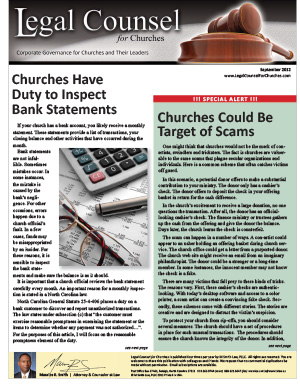If your church has a bank account, you likely receive a monthly statement. These statements provide a list of transactions, your closing balance and other activities that have occurred during the month.
Bank statements are not infallible. Sometimes mistakes occur. In some instances, the mistake is caused by the bank’s negligence. For other occasions, errors happen due to a church official’s fault. In a few cases, funds may be misappropriated by an insider. For these reasons, it is sensible to inspect the bank statements and make sure the balance is as it should.
It is important that a church official reviews the bank statement carefully every month. An important reason for a monthly inspection is stated in a North Carolina law.
North Carolina General Statute 25-4-406 places a duty on a bank customer to discover and report unauthorized transactions. The law states under subsection (c) that “the customer must exercise reasonable promptness in examining the statement or the items to determine whether any payment was not authorized…”. For the purposes of this article, I will focus on the reasonable promptness element of the duty.
Generally, a church should reconcile its bank statements every month. If this monthly routine is followed, it is hard to believe that any court would not find this to be reasonable and prompt. However, if a church waits months to balance its checkbook, it becomes more difficult to show that the practice met the reasonable prompt- ness standard in the statute.
The importance of meeting the reasonable promptness standard is to preserve a right to assert a claim against the bank for unauthorized transactions. If it is discovered that a withdrawal was not authorized, a forgery occurred or the bank made a mistake, the church has a right to demand the bank correct the error. This right is contingent on the basis that the discovery is made with reasonable promptness. If the bank shows that a church failed in its duty, the church is precluded from asserting a claim against the bank.
The law includes a one-year statute of limitations regardless of whether the church or the bank is at fault. The law provides that if the unauthorized transaction is not discovered in one year after the statement, the church may lose its right to prevail on a claim against the bank.
To protect your church’s right to recover from a bank, put a process in place for inspecting, balancing and reconciling bank statements. Be sure to make your treasurer or financial officials aware of this responsibility.
Your church’s duty to inspect your bank statements with reasonable promptness can help preserve an important right. If you have not been inspecting your bank statements, start today by going back at least one year to check for inaccuracies before time runs out.

